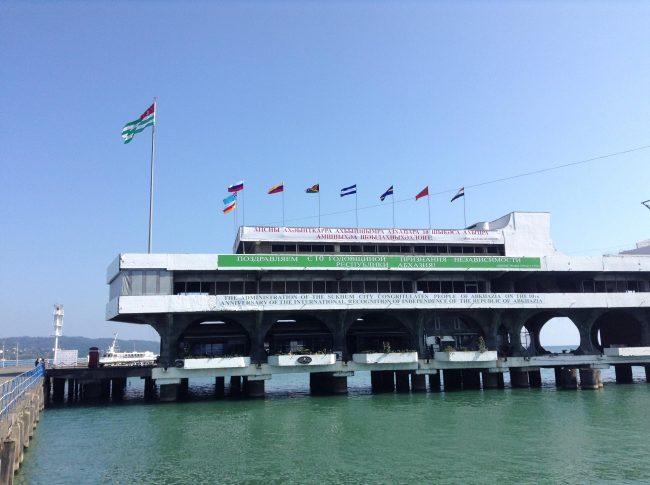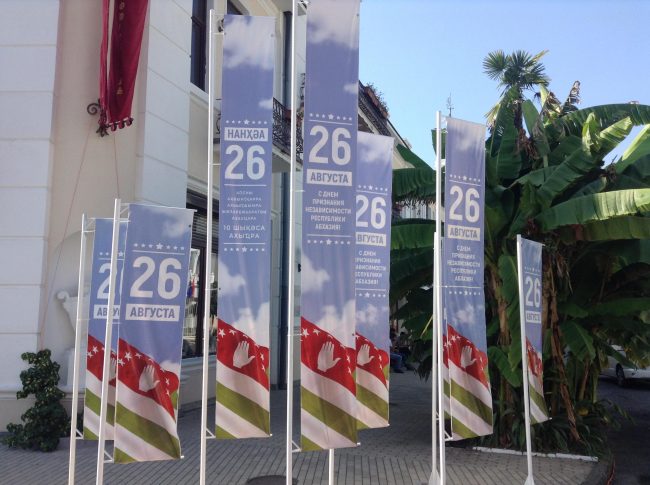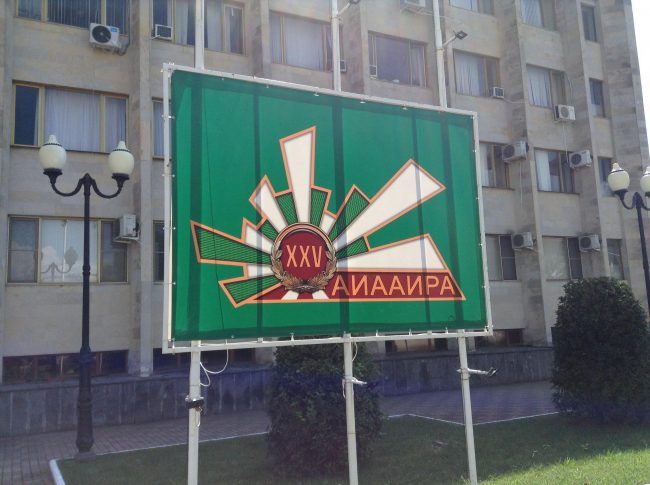
 In August, Abkhazia marked ten years since Russian recognition. Despite only four other states having followed suit, Abkhazians remain optimistic and blame Georgia for impeding their aspirations.
In August, Abkhazia marked ten years since Russian recognition. Despite only four other states having followed suit, Abkhazians remain optimistic and blame Georgia for impeding their aspirations.
Russia, Syria, Nicaragua, Venezuela, Nauru — a grouping of states that share almost nothing in common. Lying in almost opposite corners of the globe, it’s hard to think of a uniting factor between them.
There is one place, however, where the flags of each of these countries fly proudly side-by-side. On the north-eastern shore of the Black Sea, another would-be nation, Abkhazia, trumpeted its recognition by the aforementioned quintet in a major celebration on 26 August. Ten years ago on that day, Russia recognised Abkhazia’s self-declared independence, barely two weeks after the end of a bloody war between Georgia on one side and Russia, Abkhazia, and South Ossetia on the other.

Crowds thronged in Sukhumi’s streets, waving the striped green-and-white national flag, while Abkhazian President Raul Khadzhimba declared the successful ‘creation of conditions which will allow Abkhazia to develop.’ While Abkhazia first declared independence in 1992, it took another decade and a half for any UN member state to recognise them. Despite the joyous mood, Abkhazia faces a difficult situation — the international community almost universally recognises the territory as a part of Georgia — and there are few simple solutions.
‘A great friend’
While the collections of flags scattered throughout Sukhumi’s public places give no impression of primacy among Abkhazia’s recognisers, this illusion does not last long. At a photo exhibition dedicated to the 1992–1993 independence war with Georgia, there is another theme as visible as that of military sacrifices: the importance of relations with Russia.

‘For us, the main thing will always be our partnership with Russia’, says Ibragim Chkadua, an Abkhaz photographer who is co-host of the exhibition. ‘Thanks to them, for the past ten years we have had safety.’
‘Russia is a great friend to all of us’, states Garri Kupalba, the official representative in Sukhumi of Transnistria, an unrecognised breakaway state recognised internationally as part of Moldova. ‘Sukhumi and Tiraspol [the Transnistrian capital] are brother cities.’
Indeed, it is thanks to Russia that Abkhazia has any recognition at all. Prior to the August 2008 War, they had official relations only with two other such territories, South Ossetia and Transnistria. Since Moscow’s recognition, Sukhumi has added four more UN members to that list: Venezuela, Nicaragua, Nauru, and most recently, Syria, where Russia has been conducting a military intervention since 2015.
Although Pacific states Vanuatu and Tuvalu initially recognised Abkhazia’s independence in 2011, they subsequently established diplomatic relations with Georgia, recognising its constitutional borders — which include Abkhazia. However, Abkhazia’s Foreign Ministry told OC Media that the two states never officially notified them that they had withdrawn their recognition.
‘Own strides’
But some Abkhaz are quick to point out that not all their achievements are due to their northern patron, or indeed connected with it at all.
Liana Kvarcheliya, programme coordinator at the Sukhumi-based Centre for Humanitarian Programmes, told OC Media that while Russia’s support has been crucial, Abkhazia has made its own strides. ‘We have established links with the European Union’s education programmes, and Abkhaz students are now eligible for the Chevening Scholarship [allowing them to study in the United Kingdom].’
Abkhazia differs from Georgia’s other disputed territory, South Ossetia, in that it desires genuine independence. While South Ossetian President Anatoly Bibilov openly states that his end goal is unification with North Ossetia inside the Russian Federation, Sukhumi wants to chart its own course — something Kvarcheliya believes is achievable.
‘South Ossetia is landlocked, but we have the geography to make success possible’, she notes, citing the country’s long coastline. This has already proved a lifeline in the past — under sanctions by the Commonwealth of Independent States (a loose confederation of post-Soviet states) in the 1990s, there was a robust trade in smuggling from Turkey and its Black Sea port of Trabzon.
According to Kvarcheliya, strong diaspora abroad also gives Abkhazia an advantage. When tsarist Russia conquered the area in the 19th century, tens of thousands of Abkhaz fled to modern-day Turkey, Syria, and Jordan, where their descendants remain. The communities have recently come to form an economic link between their new and historical homelands.
Nevertheless, Kvarcheliya says that international sanctions and opposition by Tbilisi make further development of international ties, especially with the EU, an uphill climb.
Sharply deteriorated relations between Russia and the West in recent years, she says, have particularly complicated efforts. ‘We are seen as an ally of Russia, and this affects the willingness of Western countries to deal with us when relations are bad’, says Kvarcheliya. ‘Look at Kosovo — they declared independence and are now recognised by many [Western states]’.
‘Nothing in common with Georgia’
The defining aspect of Abkhazia’s quarter-century of de facto independence, however, has been their 1992–1993 war.
In contrast to Georgia proper, where reminders of the conflict are rare, it remains at the centre of public life in Abkhazia. Billboards and monuments to those who died are scattered throughout the countryside and urban centres.
On a public holiday like 26 August, patriotic feelings are running particularly high. At the exhibition of Abkhaz national food and drink on Sukhumi’s shoreside promenade, a group of two dozen veterans are loudly reliving their glories of battles past, with the help of liberal quantities of home-made vodka. ‘I killed 16 of them [Georgian soldiers] back then!’ one roars with enthusiasm.
Others are similarly steadfast, if a little less exuberant about it. Speaking to OC Media at his home a little later, Sergey Arshba, a company commander in the 1992–1993 war and later chief of Abkhazia’s military intelligence, does not mince words. ‘They slaughtered peaceful civilians in Sukhumi, in Gagra. But they were poor fighters. We sent them all the way back to Tbilisi.’
Arshba views the conflict to have been inevitable, the result of long-building resentment in the Soviet period. ‘Every ten years, we had problems with them’, he says. ‘We are much closer to the North Caucasus. We have nothing in common with Georgia.’
‘They only force us closer to Russia’
Liana Kvarcheliya is all too familiar with this mindset. ‘Some Abkhaz think: we have Russia, why bother with the international community? They view them as biased towards Georgia.’
But without progress on this issue, further development of Sukhumi’s ties with the world will be extraordinarily difficult.
According to Kvarcheliya, perhaps the single greatest factor preventing rehabilitation is the position of Russia. Abkhazia remains heavily dependent on payments from Moscow, which provided $78 million of the $90 million state budget in 2017. Military and security cooperation has also deepened in recently years.
This has understandably contributed to Tbilisi’s view of the territory as a Russian colony. ‘What they don’t realise is that, by shutting us off from the world, they only force us closer to Russia’, Kvarcheliya says.
There are some in Georgian civil society that agree. ‘I agree Abkhazia is not a puppet of Russia, but only partially’, says Ivane Abramashvili, executive director of Caucasian House, a Tbilisi-based NGO focused on conflict resolution. But steps to harmonise Abkhazia’s legal code with that of Russia over the past few years ‘have raised doubts’, he tells OC Media.
According to Kvarcheliya, in this environment, it’s hard to see the next decade of Abkhazia’s existence producing much more recognition. ‘In the medium term, there are not many prospects’, she admits, though she remains hopeful about deepening international ties in other respects.
Moscow and Sukhumi meanwhile continue to expand military cooperation, holding a series of military exercises on Abkhazia’s territory in the first week of September. The status quo holds on Europe’s Black Sea periphery.
All place names and terminology used in this article are the words of the author alone, and may not necessarily reflect the views of OC Media’s editorial board.




 5 October 2018
5 October 2018


